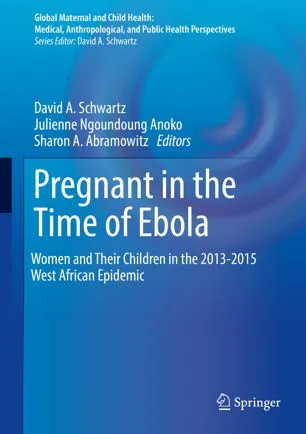Pregnant in the Time of Ebola: Women and Their Children in the 2013-2015 West African Epidemic
4.7
Reviews from our users

You Can Ask your questions from this book's AI after Login
Each download or ask from book AI costs 2 points. To earn more free points, please visit the Points Guide Page and complete some valuable actions.Related Refrences:
Introduction to 'Pregnant in the Time of Ebola: Women and Their Children in the 2013-2015 West African Epidemic'
The book 'Pregnant in the Time of Ebola: Women and Their Children in the 2013-2015 West African Epidemic' delves deeply into the intersections of global health crises, gender dynamics, and vulnerable groups' experiences during one of the deadliest viral epidemics in recent history. Authored by David A. Schwartz, Julienne Ngoundoung Anoko, and Sharon A. Abramowitz, this comprehensive work captures the multifaceted challenges faced by pregnant women and their children amidst the catastrophic Ebola outbreak in West Africa. This epidemic not only threatened the survival of millions but also exposed severe systemic vulnerabilities, particularly concerning women's health and societal roles.
Detailed Summary of the Book
The book presents an exhaustive exploration of the 2013-2015 Ebola epidemic, with a keen focus on pregnant women and their children in affected regions. Through meticulously researched chapters, it uncovers the layered tragedy of disruption in healthcare services, cultural misconceptions, and gender-based disparities that compounded the risks for expectant mothers. The authors weave narratives from numerous firsthand accounts, epidemiological data, and health policy analyses to present a holistic picture of the epidemic's impact.
Each chapter examines specific themes such as the breakdown of maternal healthcare, stigmatization of pregnant women, and the tragic bi-directional threat of Ebola transmission between mother and child. The book sheds light on the systemic inequities that led to poorer outcomes for expectant mothers and their newborns, juxtaposing these realities against the backdrop of an international health response that often overlooked these critical intersections.
Key Takeaways
- The Ebola epidemic starkly highlighted the vulnerabilities of healthcare systems in crisis zones, especially concerning maternal health services.
- Pregnant women were disproportionately affected due to both biological and socio-cultural factors, resulting in a dire need for targeted interventions.
- The book underscores the importance of culturally sensitive approaches in international health responses to better support vulnerable groups.
- Effective communication is essential in dispelling myths and managing fears surrounding infectious diseases, which can exacerbate during crises.
- Global health governance requires a lens that explicitly addresses gender disparities to mitigate the impacts of future epidemics.
Famous Quotes from the Book
"In the time of Ebola, a pregnant woman was not just a patient; she became a symbol of the systemic failures in addressing gender-specific needs in crisis response."
"The stories of these women weave a narrative of resilience and underscore the urgent necessity for reform in global health policies."
Why This Book Matters
'Pregnant in the Time of Ebola' is an essential contribution to the field of global health literature, offering critical insights into the vulnerabilities and resilience of marginalized populations. This book matters because it brings to the forefront the often-overlooked narratives of pregnant women and their children during health emergencies, challenging readers to reconsider how global health crises are approached and managed. It serves as a call to action for policymakers, healthcare providers, and international organizations to integrate gender-sensitive strategies in epidemic preparedness and response frameworks.
By highlighting the lived experiences of women during the Ebola crisis, the authors emphasize the importance of inclusive and equitable healthcare systems capable of responding to the needs of all individuals, regardless of gender or reproductive status. This book is not just an account of past failures but a blueprint for future resilience, advocating for systemic changes that could save lives in future outbreaks.
Free Direct Download
You Can Download this book after Login
Accessing books through legal platforms and public libraries not only supports the rights of authors and publishers but also contributes to the sustainability of reading culture. Before downloading, please take a moment to consider these options.
Find this book on other platforms:
WorldCat helps you find books in libraries worldwide.
See ratings, reviews, and discussions on Goodreads.
Find and buy rare or used books on AbeBooks.
1294
بازدید4.7
امتیاز0
نظر98%
رضایتReviews:
4.7
Based on 0 users review
Questions & Answers
Ask questions about this book or help others by answering
No questions yet. Be the first to ask!














